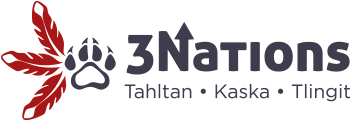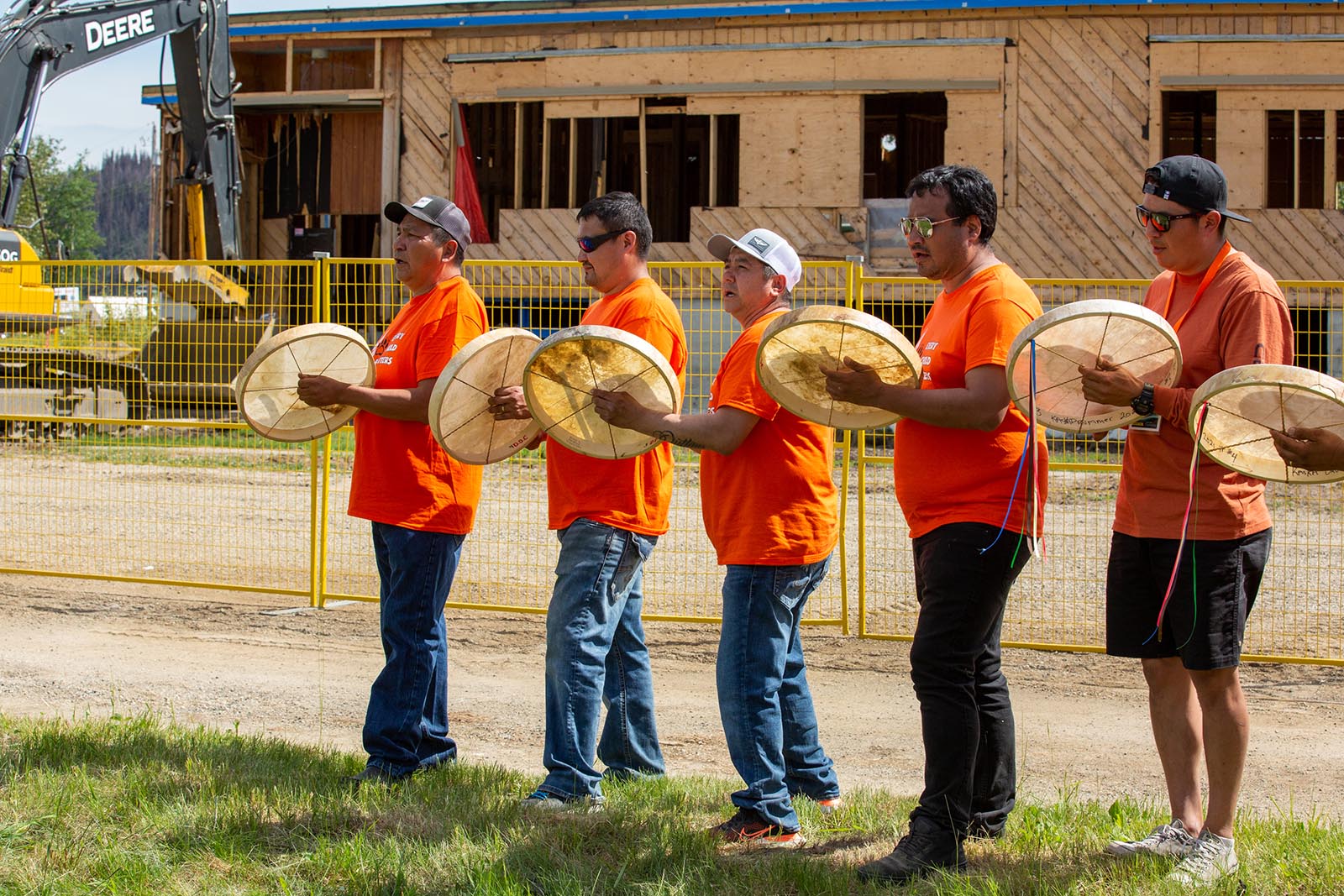John Tonin – Yukon News
July 07, 2021
The following story contains details some readers may find distressing. Yukoners in Whitehorse and the communities can schedule rapid access counselling at 1-867-456-3838. The national Indian Residential School Crisis Line can be reached at 1-866-925-4419.
After a decades-long fight, the former residential school in Lower Post is being torn to the ground.
On June 30, the 46th anniversary of the school’s closure, a ceremonial demolition and ground-blessing ceremony was witnessed by the Kaska Nation and Indigenous people from across the North.
Deputy Chief of the Daylu Dena Council Harlan Schilling made clear before the ceremonies began that the day wasn’t a sad one, instead, it was a joyous day.
“This is a happy day,” said Schilling. “It’s been a battle for over 35 years that our community has been fighting and advocating to get rid of this building.
“This day is for them. Not just our community, but all the survivors that went to this school.”
It was a happy day, but also a day to acknowledge the truth and to heal.
“For every individual, (today) is what they need for themselves,” said Schilling. “For me personally, this building has been there my entire life. My daughter is two, and I hope she never remembers what this building was.”
About the school
The school opened in 1951 in Lower Post, about 20 minutes south of Watson Lake.
It was the first Roman Catholic boarding school for Indigenous children in the region, run with support from the federal Department of Indian Affairs.
Children from nearly 40 Indigenous communities were sent to the school.
From 1954-1960 the school expanded its facilities. The federal government took over the school in 1969 and ran it until its closure on June 30, 1975.
In the mid-1990s, two former Lower Post staff members were convicted of sexually assaulting students while working at the school.
Until recently, the former residential school acted as office space for the Daylu Dena Council.
For the Kaska Dena, desire to demolish the building was a torch passed from leader to leader.
“We are proud to finally be demolishing the residential school in our community,” said Schilling. “I thank the leaders that came before me who have fought for this for years.
“Their hard work, the strength of our community, and the support of so many other Nations have made this day a reality.” The Kaska Dena will get a new multi-use facility that honours the Kaska Nation’s interests, culture and traditions as well as house the Daylu Dena Council offices.
‘It was an institution that prepared people for jail’
The demolition and ground-breaking ceremonies honoured the past, present and future. Before the ceremonies began, those gathered heard from First Nation leadership and government officials.
Liard First Nation Chief Stephen Charlie attended the Lower Post residential school for five years.
“I’m a survivor and I say that with pride because a lot of my friends are gone,” said Charlie, surrounded by his family. “My age, I’m just hitting the prime of my life. We’ve come here today to talk about how we are moving forward.
“This is about the survivors. It’s really weird because in 1970 I came here as an eight-year-old little boy with no love or nothing. Terrible five years. I said that and my voice didn’t break; it’s in the past, and my healing journey started many years ago.”
Charlie said it was an institution that prepared people for jail after 18. It was a place designed to destroy culture and language.
“This place here, that was constructed here, was designed to hurt people,” said Charlie, pointing at the school. “When I left, I had no skills, I couldn’t read, I was 17 when I could read but you’ve got to fake it ‘til you make it.
“It was all our Nations, it was an effort by the government and the churches to control us, destroy us but it didn’t work. We are even stronger than we were before. When I was scooped in 1966 I was the most vulnerable of our Nation. I’m not the most vulnerable anymore.”
When he arrived at the school, Charlie said he was given clothes and an identifying number.
“You’re not a person, you’re stripped of everything,” said Charlie. “But today, after this ceremony, I see the children here and it warms my heart. They won’t have to be going there. Not on my watch, anyhow.”
Although it was a tough day for Charlie, he said it was a good day “because we are heading in a new direction.”
Addressing Marc Miller, federal Minister of Indigenous Services, Charlie said he should bring in more First Nations to help with his portfolio.
“Bring in a couple First Nations people that think like me and we can really move mountains in Ottawa,” said Charlie. “Don’t take advice of people that don’t live Indigenous ways. You want to know how it’s done and how it can be respectfully done? Come see the Indigenous people.”
Miller said residential schools are a shame of Canada, but said today represents hope for everybody at the gathering.
“As what remains of the school is finally taken down it is my hope that the painful memories this place holds can lessen,” said Miller. “The lessons we are learning as a nation remain as we move forward that honours the former students of this school and others like it in Canada.”
Yukon Premier Sandy Silver grappled with the concept of reconciliation.
“I’ve had an awful lot of conversations over the years with First Nations leadership about the word reconciliation,” said Silver. “I’m always surprised, always learning. I’m surprised when I talk to chiefs and they say ‘reconciliation means nothing to me.’”
He likened reconciliation to a battery.
“It’s stored energy,” said Silver. “As a government we put stored energy into concepts. But that battery is useless without the conduits into the communities.”
In the Yukon, he continued, everybody is welcome at the table.
“When we gather, everybody is at our table, I’m not searching for connections, everybody is already connected,” he said. “This land and the people are connected. For better or worse. In our darkest times and our brightest futures.
“Without consultation, without reconciliation, without those conduits, a battery will never make light.”
The ceremony, Silver said, is helping people acknowledge the past while bringing people together “for our beautiful children”.
“That’s the light,” said Silver.
B.C. Premier John Horgan said it’s horrible how little Canadians know about residential schools.
“I came through the B.C. education system and I have two degrees in history and I did not learn about the black mark of residential schools in Canada until I heard elders talk about their experiences,” said Horgan.
Horgan said people need to acknowledge the truth by “staring it in the face” that is how “we will move forward together”.
“It’s a shame that Canada needs to acknowledge, not to reconcile, but acknowledge the truth.”
The past
Survivors and generational survivors of the residential school held a healing ceremony at the beginning of the day on June 30. Survivors shared, amongst themselves, their stories and experiences while at the residential school. Support staff were on hand to help.
The present
The speeches were over. The ceremony moved to the residential school, a shell of its former self. It stood a stripped-down structure of wood, surrounded by a fence to keep people safely away.
People surrounded the building and the Kaska drummers began to play and sing. Excitement filled the air, and there was dancing in the crowd.
The engine of the excavator roared to life, adding to the electricity of the moment.
The bucket raised, placing itself over the left-side door — the door hundreds of children entered when they first arrived to the school.
The engine kept humming and the drumming, the singing, the cheering got louder. Then silence, followed by a crashing of wood and concrete. The entrance was destroyed. No longer would anyone have to walk through those doors.
Old pieces of the residential school were set up around a fire. Anyone could write a message on the old piece of wood before tossing it into the flames.
When Schilling approached the fire, he held the board high for everyone to see. Triumphantly he cried, “We did it,” before tossing the piece of the school into the flames and turning away.
The future
The ground-breaking ceremony was for the new multi-use facility in Lower Post.
The space will provide recreational, educational and cultural spaces for older youth and elders and the broader community. It will also accommodate the administrative offices of the Daylu Dena Council.
It will include program rooms for beading, storytelling and elder’s tea, an indoor gym, an industrial kitchen, a garden and other outdoor recreational areas.
“Our people and our nation have never had something coming to our community,” said Schilling. “It’s going to be a place not just for the younger generation, but for the survivors to invite their friends who had such a horrible experience in Lower Post.
“This is a new beginning for them, that Lower Post can be a happy place instead of a dark memory with such a horrible cloud over it.”
Lower Post’s younger generations took part in the ceremony, standing with shovels ready to break the ground of the new facility which will sit near the banks of the Liard River.
One by one they were asked what they were most looking forward to about the new space. The popular answer? Indoor basketball courts.
Searching for lost children
The remains of over 1,500 children have been located at former residential school sites across the country. Once the former residential school in Lower Post is demolished completely, Schilling said a search for lost children will happen.
“I think that has to happen,” said Schilling. “I believe what’s happening across Canada, the spirits of the children that never made it home, they deserve that right and families deserve that closure to know exactly where their family members are.”
A close to the day
The sun showed no signs of wanting to set, but the day’s events were coming to a close.
The Warrior Walkers for Healing Nations addressed the crowd at the end of the day. The Warrior Walkers arrived before the ceremonies began and will continue their journey to Kamloops to honour all the children who did not return home from residential schools.
The Kaska Drummers had one more song for everybody. As they played, people danced around the fire. It was a good day.


